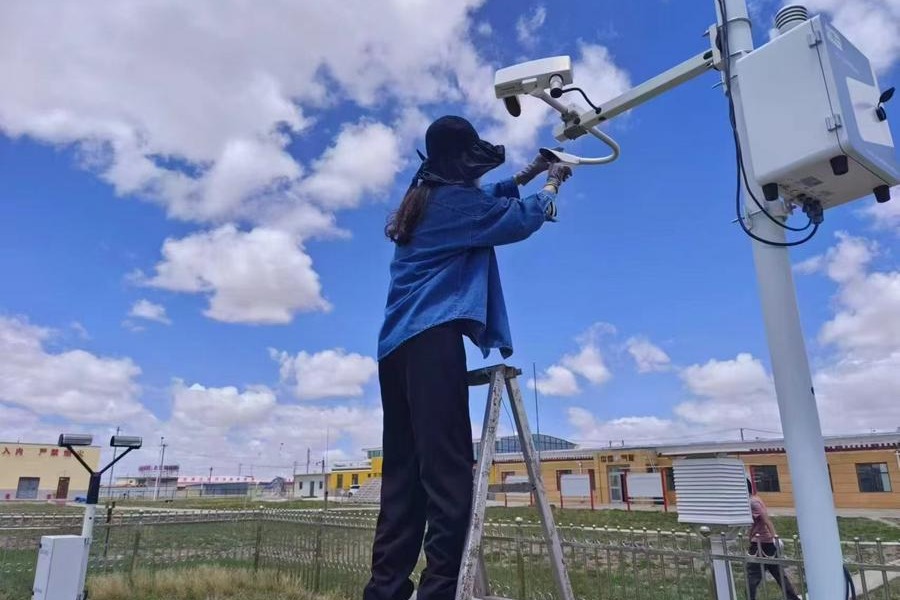Dismantling payment barriers
Fostering cross-border payment operations in ASEAN and Middle Eastern markets requires concerted efforts by Hong Kong enterprises and the SAR government. Infrastructures, data quality, practice standardization and regulatory compliance need to be strengthened to showcase the city as a payment techno


As the Chinese mainland develops reciprocal and deeper economic links with the Association of Southeast Asian Nations and Middle Eastern countries, the stage is set for cross-border payment businesses to flourish.
Two-way trade has increased as the mainland buys more oil from the Middle East, while the Gulf states step up imports of Chinese goods. This augurs well for XTransfer - China's leading business-to-business cross-border trade payment platform - which decided to tap into the Middle Eastern market.
Founded in 2017, XTransfer has secured more than 450,000 corporate clients, with local payment services licenses in the Hong Kong Special Administrative Region, Australia, Canada, the United Kingdom and the United States. The company completed its Series D financing in 2021 and has attained unicorn status, with its valuation exceeding $1 billion.
The startup is particularly optimistic about Saudi Arabia and the United Arab Emirates. It has applied for business licenses in both countries and hopes they can be granted within two years. Once a license is obtained, XTransfer can launch full-fledged cross-border payment services there.
"The Chinese mainland's cross-border payment business sector is blooming and competitive, while Middle Eastern banks, generally, are cautious about developing the industry. As the infrastructure for providing such financial services is poor, Middle Eastern banks' services in this area are very expensive," says Bill Deng, chief executive officer of XTransfer.
Thus, Middle Eastern small and medium-sized companies are forced to turn to illegal private banks for such transactions and have to deposit large amounts of cash into accounts with these banks. "And, the danger is that the accounts could be frozen by financial regulators if they are suspected of being used for money laundering, creating huge financial risks for SMEs. The problem is particularly acute as the UAE is going all out to fight global money-laundering activities," Deng tells China Daily.
As a business strategy, XTransfer prefers to team up with banks and payment services companies in those countries to provide clients with cost-efficient and time-saving cross-border payment solutions in Saudi Arabian and UAE currencies.
Besides local partnerships, XTransfer works with Luxembourg-based correspondent bank network Banking Circle, leveraging Banking Circle's comprehensive network for major currencies and an effective foreign exchange engine that supports 24 currencies. Relying on Banking Circle's infrastructure, XTransfer can offer efficient and cheap payment and fund collection options not only in major currencies like the greenback and the euro, but also in six other currencies in Europe and the Middle East, benefitting suppliers on the mainland and in Europe and the Middle East.
XTransfer also plans to include renminbi in cross-border payment services targeting Middle Eastern SMEs. "We hope to get SMEs from all over the world as our clients," says Deng.
The strategic partnership allows XTransfer to expand in the Middle East by attracting more mainland suppliers with vast markets in Europe and the Middle East to its client base. The B2B platform will provide details of the sources of capital and fund flows in every cross-border payment transaction.
By using artificial intelligence and data-driven technologies in automated reviews of all cross-border payment transactions, the startup can provide a good customer experience, raise operation efficiency and reduce costs, compared to traditional manual account reviews.
Deng describes the UAE's business environment as "very open, Westernized and business-friendly", acting as a magnet for cross-border payment services firms like XTransfer. Applying for a business license in the UAE is quite straightforward and very similar to the process in Western countries.
Saudi Arabia is less open and has a higher threshold than the UAE for overseas companies to operate. In the kingdom, different financial regulators are responsible for checking a company's background, making the application process longer than in the UAE. XTransfer, thus, has to devote more time and resources to communicating with Saudi Arabian financial regulatory bodies in securing business licenses.
As most Middle Eastern countries are English-speaking and XTransfer has spent time aligning with Muslim traditions and customs, the problem of overcoming language and Muslim customs hurdles is not too big for the company in the Middle East.
Multiple obstacles
According to Deng, developing the Middle Eastern and ASEAN markets presents both snags and advantages. The key point is the business potential of the cross-border payment industry in the Middle East as its financial services sector catches up with the digitalization process in the aftermath of COVID-19. But Middle Eastern lenders are relatively unfamiliar with the product knowledge and regulatory requirements compared to their ASEAN counterparts. XTransfer has to spend more time working with local business partners in Middle Eastern countries.
The 10-member ASEAN grouping has surpassed the US and Europe as China's largest exports market, says Deng, and XTransfer is aiming big in this economic bloc. The company has launched operations in Thailand and Indonesia and will roll out cross-border payment services soon in Vietnam and the Philippines. In Singapore, it has received approval, in principle, from the Monetary Authority of Singapore to conduct cross-remittance services with SMEs in the city-state.
But Deng says tapping the ASEAN market has difficulties. "Although ASEAN member states are closer to the Chinese mainland geographically, they are more diverse in religion, customs and language. We have maximized what we have learnt in the Middle East in making ourselves more accustomed to the ASEAN market."
A survey conducted by Singapore-based United Overseas Bank shows that nearly 80 percent of 550 Hong Kong enterprises polled aim to expand overseas in the next three years to boost profitability, revenue and their global reputation. About 85 percent of respondents from the manufacturing and engineering sectors said they were interested in expanding overseas, followed by the wholesale trade sector (84 percent).
The UOB Business Outlook Study 2024 (SMEs and Large Enterprises) shows that 31 percent of the respondents planned to expand in Southeast Asia, with Malaysia (48 percent), Thailand (40 percent) and Indonesia (36 percent) emerging as the top markets of interest within the ASEAN bloc.
But there are obstacles to going forward. Up to 41 percent of the respondents said they were struggling with regulatory, compliance and tax challenges in trying to expand overseas, adding that financial support through funding or grants would be most effective for overseas expansion.
Adaline Zheng, chief executive officer of UOB Hong Kong, says there is a lack of harmonized standards and regulations within ASEAN, creating compliance risks and administrative costs for foreign companies. The different tax incentive programs in the grouping also make it difficult for foreign companies to benefit from them.
Zheng notes that other issues, such as labor and intellectual property laws, as well as ESG (environmental, social and governance) requirements need to be addressed in the local market context. "Therefore, it is very important to have business partners with local expertise, specific industry knowledge, and strong business networks in collaborating with government sectors, trade associations and professional services to increase the chance of success in the new market."
She emphasizes that Hong Kong needs to understand customer preferences by localizing marketing strategies in product features and after-sales services. Hong Kong enterprises should make use of digital capabilities to enhance tangible value when venturing into the ASEAN market.
'An important gateway'
In ASEAN's new economic context, Hong Kong remains an important gateway for enterprises in the Guangdong-Hong Kong-Macao Greater Bay Area to enter the ASEAN market. "Companies can develop cross-border businesses using Hong Kong's financial solutions, foreign direct investment consulting, ESG reporting, information technology, logistics support, artificial intelligence, digital marketing and much more," says Zheng.
She stresses the importance of Hong Kong enterprises providing value-added services in facilitating cross-border operations. "As ASEAN economies continue to develop, their domestic capabilities and regional integration will increase. Hence, Hong Kong companies should focus on enhancing tangible value through specialized expertise, innovation and services. That will help the city transform from a 'superconnector' to a 'super value-adder'."
"To mitigate risks and increase the rate of success in foreign markets, Hong Kong firms can seek strategic partnerships with local financial institutions and financial technological companies through alliances, licensing agreements or joint ventures," suggests Falcon Chan, a partner of strategy, risk and transactions at Deloitte China. "This would help businesses to gain rapid access to local expertise, distribution channels and customer bases. Adaption is important in catering to local nuances - from cultural norms, languages, to varying regulatory frameworks across markets in ASEAN and the Middle East."
Chan says companies must leverage established e-commerce platforms for seamless integration of cross-border payment solutions. Prioritizing factors, such as low transactions fees, quick settlement times, multi-currency support, transparent exchange rates and robust security measures, are essential for online merchants.
"To enhance competitiveness, digital businesses can differentiate through value-added capabilities from advanced analytics to AI-powered risk management tools, allowing merchants to optimize end-to-end processes and counter fraud," he says.
Under the new economic context of fostering regional integration with ASEAN and the Middle East, Chan underscores Hong Kong's pivotal role as a global financial gateway and innovation hub in the burgeoning payments industry. "The government can further extend financial incentives and regulatory sandboxes to spur research, trials and development in next-generation money-moving technologies. Besides scalable digital solutions, efforts should focus on enhancing payment infrastructures, promoting data quality, standardizing practices and aligning solutions with market needs."
In Chan's view, the SAR can explore viable public-private partnerships and foster coordination across different supervisory bodies. "By facilitating cross-regional alliances among government agencies, industry associations and technology partners, we can drive innovation and adoption, streamline regulatory processes and ensure compliance."
- Descendants of war heroes advocate reading history to honor the past
- Guangdong court sets standards for AI copyright
- Construction of China's 2nd large cruise ship reaches milestone
- Chinese students cook 2,000-year-old rice dish based on ancient manuscript
- Beijing court steps up efforts to resolve insurance disputes involving gig workers
- Legislators reviewing law to enhance reintegration of prisoners




































